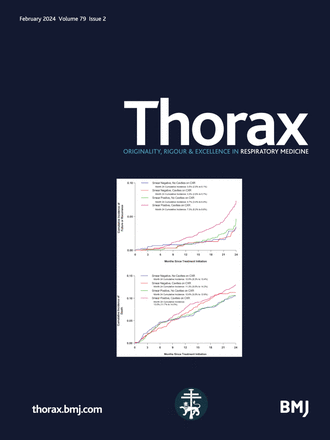杂志俱乐部
IF 7.7
1区 医学
Q1 RESPIRATORY SYSTEM
引用次数: 0
摘要
中性粒细胞炎症是支气管扩张进展和恶化的关键驱动因素。Brensocatib是一种口服二肽基肽酶1 (DPP1)抑制剂,可阻止中性粒细胞丝氨酸蛋白酶的激活。该III期随机双盲ASPEN试验(N Engl J Med 2025; 392:1569-1581)在35个国家的1721例非囊性纤维化支气管扩张患者中评估了每日一次10 mg或25 mg brensocatib与安慰剂在52周内的疗效和安全性。brensocatib显著降低了确诊肺恶化的年化率。服用10毫克和25毫克的患者每年分别经历1.02次和1.04次恶化,而安慰剂组为1.29次。其发生率比为0.79 (95% CI, 0.68 ~ 0.92;p=0.004)和0.81 (95%CI, 0.69 ~ 0.94;p = 0.005)。两种剂量均延迟了首次恶化的时间,近一半的brensocatib治疗患者在1年后仍无恶化,而安慰剂组为40.3%。25毫克组肺功能下降最小,平均下降24毫升,而安慰剂组平均下降62毫升(p=0.04)。生活质量,通过生活质量-支气管扩张问卷的呼吸症状领域测量,brensocatib改善更多,特别是在高剂量时。不良事件发生率为…本文章由计算机程序翻译,如有差异,请以英文原文为准。
Journal club
Neutrophilic inflammation is a key driver of bronchiectasis progression and exacerbations. Brensocatib, an oral inhibitor of dipeptidyl peptidase 1 (DPP1), prevents activation of neutrophil serine proteases. The phase III randomised double-blind ASPEN trial (N Engl J Med 2025;392:1569–1581) evaluated the efficacy and safety of once-daily brensocatib at 10 mg or 25 mg compared with placebo over 52 weeks in 1721 patients with non-cystic fibrosis bronchiectasis across 35 countries. The annualised rate of adjudicated pulmonary exacerbations was significantly reduced with brensocatib. Patients receiving 10 mg and 25 mg experienced 1.02 and 1.04 exacerbations per year respectively, compared with 1.29 in the placebo group. This corresponded to rate ratios of 0.79 (95% CI, 0.68 to 0.92; p=0.004) and 0.81 (95%CI, 0.69 to 0.94; p=0.005). Time to first exacerbation was delayed with both doses, and nearly half of brensocatib-treated patients remained exacerbation-free at 1 year compared with 40.3% in the placebo group. Lung function decline was smallest in the 25 mg group, with an average decline of 24 milliliters compared with 62 milliliters with placebo (p=0.04). Quality of life, as measured by the Respiratory Symptoms domain of the Quality of Life–Bronchiectasis questionnaire, improved more with brensocatib, especially at the higher dose. The incidence of adverse events was …
求助全文
通过发布文献求助,成功后即可免费获取论文全文。
去求助
来源期刊

Thorax
医学-呼吸系统
CiteScore
16.10
自引率
2.00%
发文量
197
审稿时长
1 months
期刊介绍:
Thorax stands as one of the premier respiratory medicine journals globally, featuring clinical and experimental research articles spanning respiratory medicine, pediatrics, immunology, pharmacology, pathology, and surgery. The journal's mission is to publish noteworthy advancements in scientific understanding that are poised to influence clinical practice significantly. This encompasses articles delving into basic and translational mechanisms applicable to clinical material, covering areas such as cell and molecular biology, genetics, epidemiology, and immunology.
 求助内容:
求助内容: 应助结果提醒方式:
应助结果提醒方式:


